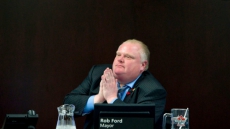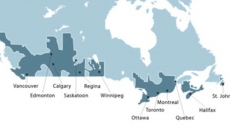TORONTO - The head of Wind Mobile, Tony Lacavera, says the small wireless company will look to boost its network's reach and speed after he reached a deal with several private equity firms to buy out its foreign owner.
Lacavera, Wind chairman and CEO, said Tuesday the company will look to buy wireless spectrum either from other carriers or in the federal auction of cellular airwaves early next year.
Dutch-Russian VimpelCom confirmed Monday it agreed to sell its majority stake in Wind to a group that includes Lacavera and several private equity firms in a deal worth about $300 million.
Lacavera said that in the long term Wind has to roll out an LTE wireless network, an expensive process that's already well-advanced at Canada's three biggest wireless carriers, and that will require additional spectrum — the radio frequencies that carry voice, video and data traffic.
"Shaw's got some spectrum out West. Videotron has some spectrum in Ontario, B.C. and Alberta. And Mobilicity has some spectrum. So there's three parties that are holding spectrum that we could potentially do a deal with. But there are also two upcoming auctions as well," Lacavera said.
"So one of these sources is going to have to work out for us and we're going to assess all of it."
Lacavera, who owns about 35 per cent of Wind Mobile through Globalive, has been attempting to position it as a significant competitor to Canada's three biggest carriers, which collectively have about 90 per cent of the total subscriber base.
Wind currently has garnered about 750,000 customers, or less than 10 per cent of any of the Big Three: Rogers (TSX:RCI.B), Telus (TSX:T) and BCE's Bell (TSX:BCE), since it entered the wireless market in 2009.
Lacavera says that Wind offers customers more clarity on the cost of service, since it offers unlimited data plans that avoid overage fees. It also allows customers to hook up their own phones or devices to its network, or purchase them through Wind.
"You know, we're not the fastest. We're not the cheapest. We're none of those things. We're good value for your money and I think we deliver a good, solid customer experience," Lacavera said.
Lacavera said the private equity firms that are backing the VimpelCom buyout haven't made specific commitments for future financing but their participation is a "validation" of Wind by sophisticated investors.
If Wind continues to acquire subscribers at the current pace, build out its network and improve service "that will, obviously give investors confidence to continue to finance the company," Lacavera said.
The new investment group includes West Face Capital, a Toronto-based private equity firm. Other financial partners include Tannenbaum Capital Partners, LG Capital Investors, Serruya Private Equity and Novus Wireless Communications.
VimpelCom said it's selling its interest in the Canadian company for approximately $135 million and it will also be released from Wind Canada's debt obligations. The third-party debt is worth about $150 million.
Though Wind hasn't faced the same type of financial problems that pushed other small carriers Mobilicity and Public Mobile into court-supervised protection, it has had difficulty raising funds for capital investments that could speed its growth by allowing it to expand and improve its own network.
Its network is concentrated in populated areas of Ontario, Alberta and British Columbia but requires access to one of the Big three's national networks or partnerships with other small carriers, and likely will for some time to come. It also wants to invest in additional spectrum licences.
Barclays telecom analyst Phillip Huang said the deal has been widely speculated for many weeks and added that the possibility of another national wireless carrier has affected shares of the Big Three.
However, Huang said that a revitalized Wind reduces the chance that Quebecor's Videotron (TSX:QBR.B) will take the financial risk of expanding beyond its home province of Quebec at this time.
"Without the involvement of a new strategic player, we believe the perceived threat to the Big 3 of a recapitalized Wind ("Wind 2.0") would be significantly lower. We also believe the stable and rational pricing environment currently in place would less likely be disrupted," Huang wrote in a research note.
"From a regulatory perspective, it would satisfy the government's goal to sustain four facilities-based wireless players in each of the major markets (at least through the next federal election in October 2015), potentially lowering the urgency to adopt more disruptive policies."
Greg Boland, president and chief executive officer of West Face Capital, said in the statement that the government's support for long-term competition in the wireless sector "has not gone unnoticed by the investment community."
Industry Canada has taken a number of other steps that have been favourable to Wind — including capping how much the big three carriers can charge for traffic that use their larger national networks — but Wind's access to foreign investment for further growth was hurt by Ottawa's decision to block VimpelCom from buying Lacavera's portion of the business last year.
A VimpelCom subsidiary helped fund Wind Mobile's entry into Canada's wireless industry about five years ago but the federal government blocked the European telecom company from acquiring full control last year, citing unspecified security concerns.
VimpelCom later refused to fund Wind's participation in the January 2014 auction of high-quality wireless spectrum that could have helped the company improve or expand its services.






